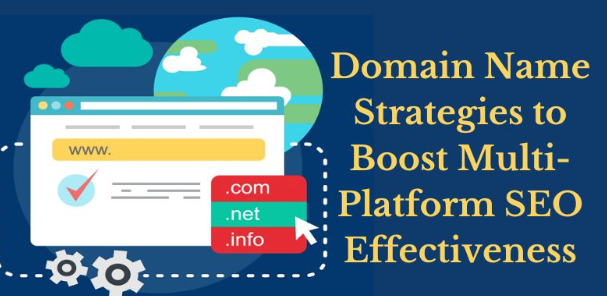Domain Name Strategies to Boost Multi-Platform SEO Effectiveness

In the dynamic world of digital marketing, a well-thought-out domain name strategy is crucial for enhancing your multi-platform SEO efforts. Your domain name is not only your website’s address; it plays a vital role in your brand identity and search engine optimization (SEO) strategy. This blog delves into effective domain name strategies to help you boost your multi-platform SEO effectiveness.
Understanding the Importance of Domain Names in SEO
Your domain name is a fundamental part of your online presence. It influences your brand’s credibility, helps with search engine rankings, and affects user experience. A strategic domain name can improve your visibility across many platforms, making it easier for users to find and engage with your content. For instance, when looking for digital marketing companies in Chennai, having a relevant and memorable domain name can make your business stand out and be more easily found by potential clients.
Domain Name and SEO:
- Relevance: A domain name with relevant keywords can improve your SEO. Search engines factor in domain names for ranking, so including keywords can boost search visibility.
Branding:
- A unique and memorable domain name enhances your brand identity, indirectly boosting your SEO by increasing direct traffic and repeat visits.
- User Experience: A clear and descriptive domain name helps users grasp your site’s purpose, enhancing click-through rates and reducing bounce rates.
Choosing the Right Domain Name
Choosing the right domain name is the initial step in building a strong SEO strategy. Here are some key considerations:
Keyword Incorporation:
Add relevant keywords into your domain name to improve your posibility of ranking for those terms, but ignore keyword stuffing. Focus on creating a natural and readable domain that makes sense to users.
Brandability:
Select a domain name for easy to remember, spell, and pronounce. A brandable domain boosts your brand’s recognition and can better attract and retain visitors.
Short and Simple:
Keep your domain name concise. Shorter domain name are easy to remember and less prone to typing errors. Aim for a name that is straightforward and to the point.
Avoid Hyphens and Numbers:
Stick to a domain name with letters only. Hyphen numbers can be confusing and are often misremembered or mistyped. They can also appear spammy to search engines.
Domain Extension:
The most common domain extension is .com, but there are so many other options such as .net, .org, and country-specific extensions like .co.uk. While .com is generally preferred for its familiarity and trustworthiness, choosing the right extension can depend on your target audience and brand strategy.
Domain Name and Multi-Platform SEO
A strategic domain name supports your multi-platform SEO efforts by creating a cohesive online presence. Here’s how:
Consistency Across Platforms:
Ensure consistency in your domain name across all digital platforms, including social media profiles, email addresses, and other online properties. Consistent branding helps build trust and recognition, which can enhance your SEO performance.
Subdomains vs. Subdirectories:
Decide whether to use subdomains (e.g., blog.yourdomain.com) or subdirectories (e.g., yourdomain.com/blog) for different sections of your website. Subdirectories are generally preferred for SEO because they contribute to the main domain’s authority. However, subdomains can be useful for separating distinct aspects of your business.
Local SEO:
If you’re targeting local audiences, consider incorporating your location into your domain name.
Mobile Optimization:
Ensure that your domain name and website are optimized for mobile devices. With the increasing use of smartphones, have a mobile-friendly website is important for both user experience and SEO.
Domain Name and Link-Building
Link-building is a crucial aspect of SEO, and your domain name can impact your link-building efforts:
Quality Backlinks:
A strong domain name can attract high-quality backlinks. When other reputed websites link to your domain, it signals to search engines that your website is trust and authoritative.
Anchor Text:
When building links, use descriptive and relevant anchor text that includes your target keywords. Avoid over-optimization and clear that the anchor text aligns with the content it links to.
Outreach and Networking:
Engage in outreach and networking with industry influencers and bloggers. Building relationships can lead to valuable backlink exposure for your domain.
Avoid Spammy Links:
Be cautious of acquiring links from low-quality or spammy sites. These links can harm your SEO efforts and may result in penalties from search engines.
Domain Name Changes and SEO Impact
Sometimes, changing your domain name becomes necessary due to rebranding or other reasons. It’s essential to handle domain changes carefully to minimize the impact on your SEO:
301 Redirects:
Implement 301 redirects from your previous domain to the current one. This makes sure that visitors and search engines are redirected to the correct pages, preserving your existing SEO value and link equity.
Update Internal Links:
Update all internal links to redirect the new domain name. This helps prevent broken links and ensures a seamless user experience.
Notify Search Engines:
Use tools like Google Search Console to notify search engines of the domain change. Submit a change of address request to help search engines understand the transition.
Monitor Performance:
Monitor your website’s performance closely after the domain change. Keep an eye on traffic, rankings, and any potential issues to address them promptly.
Domain Name Security and Maintenance
Maintaining the security of your domain name is vital for protecting your SEO efforts:
Domain Registration:
Make sure that your domain name is registered with a reputable registrar. Regularly renew your domain to prevent accidental expiration and potential loss of ownership.
Secure Your Domain:
Enable domain locking and use strong passwords to protect your domain from unauthorized access. Consider domain privacy protection to keep your registration information confidential.
Monitor Expiration Dates:
Keep track of your domain’s expiration date and renew it well in advance. An expired domain can lead to loss of SEO value and potential disruption to your online presence.
Regular Updates:
Keep your website and domain-related software up to date. Regular updates help prevent security vulnerabilities and ensure smooth functionality.
Leveraging Domain Name for Brand Building
Your domain name plays a important role in brand building, which can impact your SEO:
Brand Authority:
A well-chosen domain name can enhance your brand’s authority and credibility. A strong brand presence can lead to improve trust, higher click-through rates, and better SEO performance.
Social Proof:
Encourage satisfied users to share their experiences and reviews. Positive social proof can enhance your brand’s reputation and contribute to improved SEO.
Engage with Your Audience:
Develop valuable content and interact with your audience through your domain name. Cultivating a strong online community around your brand can boost traffic, generate backlinks, and enhance overall SEO success.
Conclusion
A strategic domain name is essential for effective multi-platform SEO. Selecting the right domain name, maintaining consistency across platforms, and prioritizing link-building and security can significantly improve your online presence and improve SEO performance. For instance, when looking for SEO companies in Chennai, having a relevant and memorable domain name can make your business stand out and be more easily found by potential clients. Your domain name is more than just an address; it’s a powerful asset for building your brand and attracting organic traffic. Investing time and effort into choosing and managing your domain name can yield long-term benefits for your SEO strategy.




